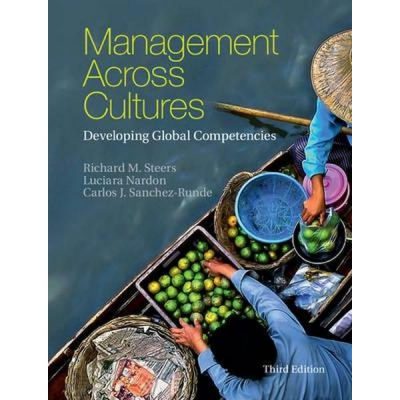 Authors: Richard M. Steers, Luciara Nardon, and Carlos J. Sanchez-Runde
Authors: Richard M. Steers, Luciara Nardon, and Carlos J. Sanchez-Runde
Publisher: Cambridge University Press – 405 pages
Book Review by: Sonu Chandiram
For a manager to succeed in today’s world, a certain mindset is required, that includes a competitive and winning spirit, drive, a desire to excel and stand out from others, a creative- thinking and problem-solving mind, and very importantly, the ability to observe and identify problems and generate ideas to solve them, with innovative products and services.
A manager who wants succeed – typically by increasing revenues and profits for the company he works at – also needs, not only the ingredients of a winning mindset that we have mentioned above, but also certain specific types of experience and knowledge, and sets of skills.
The past work experience he or she has, must certainly be relevant to achieving the goals he has created by himself, or has been tasked with by his boss.
The specific knowledge he has acquired and possesses needs to be in areas that his position requires. For example, to successfully run and grow sales in a given product line relating to a specific technology, he needs to have a good working knowledge of that technology and its practical applications for consumers.
The sets of skills needed could be many and varied. An investment banking department head for example, must have the skill to analyze financial statements and be able to answer ‘what-if’ scenario questions. A personnel department manager must have the requisite people skills to interview and hire people that would become valuable assets, not liabilities, to a company.
Companies that grow and become multinational in nature, with regional or national branches in several parts of the world, can prosper when they have managers that possess multicultural competence, as the authors of this book from three different countries – Richard M. Steers, Luciara Nardon, and Carlos J. Sanchez-Runde – point out in their Preface.
Not only must internationally-located regional and country managers have the ability to keenly observe what sells well in the local market that they work in, but also create products that adapt to satisfy local demand. For example, most people in India do not eat beef. So when McDonalds entered the India market, they offered lamb burgers.
Multicultural competence is the focus of this book and is discussed extensively throughout in the context of many topics covered the 12 chapters of this book. We provide you an overview below by listing the titles of its chapters along with other elements that precede them and form its outline of contents:
List of Exhibits
Guided Tour
Preface
- Management Across Cultures: An Introduction
- Global Managers: Challenges and Responsibilities
- Cultural Environments
- Organizational Environments
- Communicating Across Cultures
- Leading Global Organizations
- Negotiating Global Partnerships
- Managing Ethical Conflicts
- Managing Work and Motivation
- Managing Global Teams
- Managing Global Assignments
- Lessons Learned
Besides the crucial importance of having a competent country manager (“who is perpetually caught in the middle,” the authors remark), among the other ingredients of success in the global economy are the following:
- Innovative ideas and products
- Access to raw materials
- Ability to successfully tap into the local labor market
- Savvy marketing strategies
- Solid financing
- Sustainable supply chain
- Predictable logistical support
Since this book is about successful management in different cultural, economic, political and social environments around the world, Steers, Nardon and Sanchez-Runde emphasize the importance of having a manager who is able to able “deliver results” despite increasing pressures on him or her each passing year across most industries and services.
So they ask this crucial question: What do managers need to know to not only survive but thrive, to receive personal rewards such as increased compensation and promotions to higher positions with the organization? They need to understand:
- Fundamentals of business practices such as
- Accounting
- Application of emerging technologies to organizational operations
- Finance
- How to work with people and organizations to get their jobs done
- Legal institutions
- Logistics
- Marketing
- Operations
- Outsourcing
- Political risk
- Strategy
- Micro- and macroeconomics
All these are part of what the authors term multicultural competence. Having lived in several countries, I must add that not only understanding the customs and traditions and speaking the local (language(s) certainly puts the manager at an advantage over other multinational and local competitors.
Not many books are available out there on how companies can achieve success in international markets. This is one of those rare books that’s a good one because it is comprehensive in its approach and thorough in its coverage.
Authors:
Richard M. Steers is Professor Emeritus of Organization and Management at the Lundquist College of Business at the University of Oregon.
Luciara Nardon is an Associate Professor of International Business at Sprott School of Business at Carleton University in Canada.
Carlos J. Sanchez-Runde is Professor and Director in the Department of Managing People in Organizations at IESE Business School at University of Navarra in Spain.






